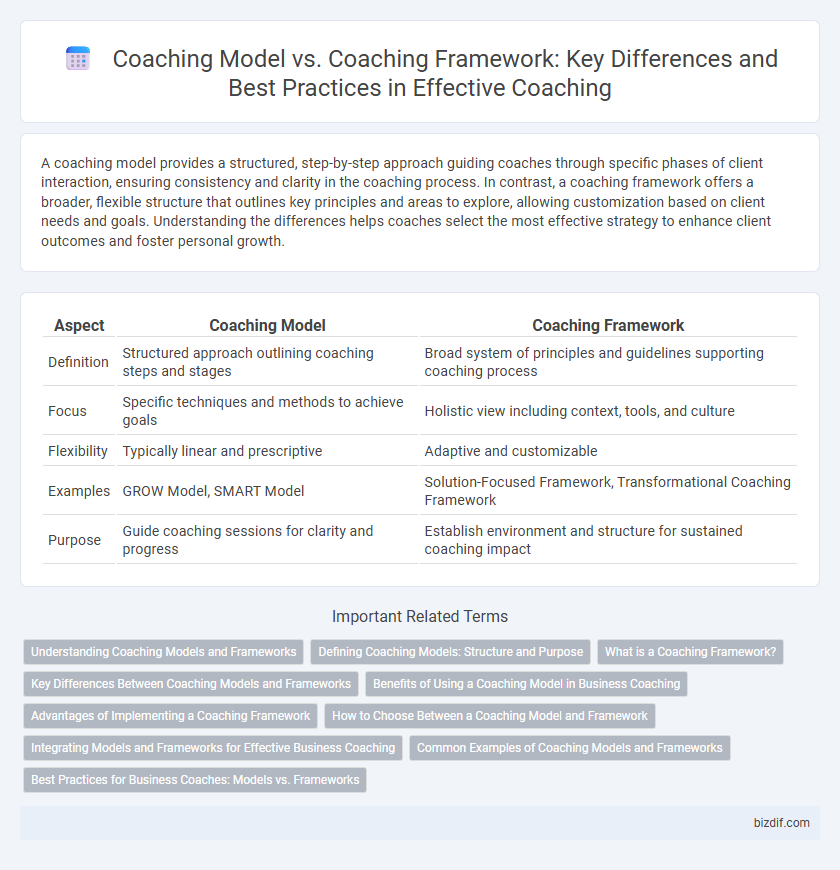A coaching model provides a structured, step-by-step approach guiding coaches through specific phases of client interaction, ensuring consistency and clarity in the coaching process. In contrast, a coaching framework offers a broader, flexible structure that outlines key principles and areas to explore, allowing customization based on client needs and goals. Understanding the differences helps coaches select the most effective strategy to enhance client outcomes and foster personal growth.
Table of Comparison
| Aspect | Coaching Model | Coaching Framework |
|---|---|---|
| Definition | Structured approach outlining coaching steps and stages | Broad system of principles and guidelines supporting coaching process |
| Focus | Specific techniques and methods to achieve goals | Holistic view including context, tools, and culture |
| Flexibility | Typically linear and prescriptive | Adaptive and customizable |
| Examples | GROW Model, SMART Model | Solution-Focused Framework, Transformational Coaching Framework |
| Purpose | Guide coaching sessions for clarity and progress | Establish environment and structure for sustained coaching impact |
Understanding Coaching Models and Frameworks
Coaching models provide structured, step-by-step approaches for guiding clients through personal or professional development, emphasizing specific methodologies like the GROW or CLEAR models. Coaching frameworks offer broader, flexible structures that outline key components and principles, allowing coaches to adapt techniques based on client needs and contexts. Understanding the distinction between models and frameworks enhances a coach's ability to select and customize tools that maximize client outcomes and engagement.
Defining Coaching Models: Structure and Purpose
Coaching models provide structured methodologies guiding the coaching process through clearly defined stages and techniques aimed at achieving client goals. These models emphasize a systematic approach, such as the GROW (Goal, Reality, Options, Will) model, ensuring measurable progress and accountability. Unlike broader coaching frameworks, models focus specifically on step-by-step client interaction and goal attainment strategies.
What is a Coaching Framework?
A coaching framework is a structured approach that outlines the key stages and elements involved in the coaching process, providing coaches with a clear roadmap to guide client interactions. Unlike a coaching model, which often describes specific theories or methods, a framework emphasizes the sequential flow and integration of various coaching components such as goal setting, action planning, and feedback. This strategic structure enhances consistency, effectiveness, and adaptability in diverse coaching scenarios.
Key Differences Between Coaching Models and Frameworks
Coaching models provide a structured step-by-step approach, often outlining specific phases such as goal setting, exploration, and action planning, whereas coaching frameworks serve as broader conceptual structures that guide coaching strategies without prescribing detailed methods. Models tend to emphasize prescriptive processes and techniques applicable in coaching sessions, while frameworks offer flexible principles that adapt to various coaching contexts and client needs. Understanding these key differences helps coaches select the right tool to enhance client growth and operationalize coaching practices effectively.
Benefits of Using a Coaching Model in Business Coaching
Using a coaching model in business coaching provides a structured approach that enhances goal clarity, accountability, and measurable progress. It enables coaches to consistently apply proven strategies tailored to individual client needs, increasing effectiveness and client satisfaction. This systematic framework fosters continuous improvement, empowering businesses to achieve sustainable growth and improved leadership skills.
Advantages of Implementing a Coaching Framework
Implementing a coaching framework provides a structured approach that ensures consistency and clarity throughout the coaching process, enhancing both coach and client alignment. Unlike coaching models, frameworks integrate multiple methodologies and tools, fostering adaptability and scalability across diverse coaching scenarios. This comprehensive structure supports measurable outcomes, continuous improvement, and a clear roadmap for professional development.
How to Choose Between a Coaching Model and Framework
Choosing between a coaching model and a coaching framework depends on your specific goals and the level of structure required. Coaching models offer defined, step-by-step processes that guide client transformation, ideal for facilitators seeking clarity and consistency. Coaching frameworks provide flexible guidelines adaptable to diverse client needs, making them suitable for coaches aiming to tailor sessions dynamically while maintaining a coherent approach.
Integrating Models and Frameworks for Effective Business Coaching
Integrating coaching models such as GROW or CLEAR with comprehensive coaching frameworks enhances the structure and adaptability of business coaching processes. Effective business coaching leverages the strengths of various models to address specific client needs within a robust framework that promotes goal clarity, progress assessment, and actionable strategies. This integration supports sustained professional development and drives measurable business outcomes.
Common Examples of Coaching Models and Frameworks
Common coaching models such as GROW (Goal, Reality, Options, Will) and SMART (Specific, Measurable, Achievable, Relevant, Time-bound) provide structured approaches for goal setting and decision-making. Frameworks like the Co-Active Coaching model emphasize the relationship between coach and client, integrating emotional intelligence and active listening. These examples illustrate practical methods used by coaches to facilitate personal and professional development.
Best Practices for Business Coaches: Models vs. Frameworks
Effective business coaches distinguish between coaching models and frameworks to optimize client outcomes; models provide structured, step-by-step processes such as GROW or SMART goal-setting, while frameworks offer flexible, adaptable approaches tailored to unique business challenges. Best practices include integrating proven models with customizable frameworks to address specific client needs, fostering clarity, accountability, and sustainable growth. Leveraging both tools enhances strategic thinking and facilitates measurable progress in leadership development and organizational performance.
Coaching Model vs Coaching Framework Infographic

 bizdif.com
bizdif.com